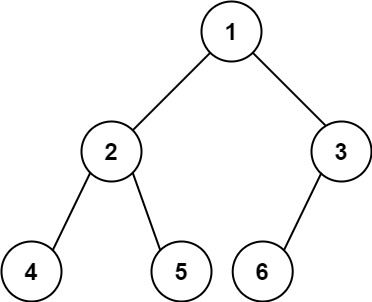Given the root of a complete binary tree, return the number of the nodes in the tree.
According to Wikipedia, every level, except possibly the last, is completely filled in a complete binary tree, and all nodes in the last level are as far left as possible. It can have between 1 and 2h nodes inclusive at the last level h.
Example 1:
Input: root = [1,2,3,4,5,6] Output: 6
Example 2:
Input: root = [] Output: 0
Example 3:
Input: root = [1] Output: 1
Constraints:
- The number of nodes in the tree is in the range
[0, 5 * 104]. 0 <= Node.val <= 5 * 104- The tree is guaranteed to be complete.
Follow up: Traversing the tree to count the number of nodes in the tree is an easy solution but with
O(n) complexity. Could you find a faster algorithm?
# Definition for a binary tree node.
# class TreeNode:
# def __init__(self, val=0, left=None, right=None):
# self.val = val
# self.left = left
# self.right = right
class Solution:
def countNodes(self, root: TreeNode) -> int:
def depth(root):
res = 0
while root:
res += 1
root = root.left
return res
if root is None:
return 0
left_depth = depth(root.left)
right_depth = depth(root.right)
if left_depth > right_depth:
return (1 << right_depth) + self.countNodes(root.left)
return (1 << left_depth) + self.countNodes(root.right)/**
* Definition for a binary tree node.
* public class TreeNode {
* int val;
* TreeNode left;
* TreeNode right;
* TreeNode() {}
* TreeNode(int val) { this.val = val; }
* TreeNode(int val, TreeNode left, TreeNode right) {
* this.val = val;
* this.left = left;
* this.right = right;
* }
* }
*/
class Solution {
public int countNodes(TreeNode root) {
if (root == null) {
return 0;
}
int leftDepth = depth(root.left);
int rightDepth = depth(root.right);
if (leftDepth > rightDepth) {
return (1 << rightDepth) + countNodes(root.left);
}
return (1 << leftDepth) + countNodes(root.right);
}
private int depth(TreeNode root) {
int res = 0;
while (root != null) {
++res;
root = root.left;
}
return res;
}
}/**
* Definition for a binary tree node.
* struct TreeNode {
* int val;
* TreeNode *left;
* TreeNode *right;
* TreeNode() : val(0), left(nullptr), right(nullptr) {}
* TreeNode(int x) : val(x), left(nullptr), right(nullptr) {}
* TreeNode(int x, TreeNode *left, TreeNode *right) : val(x), left(left), right(right) {}
* };
*/
class Solution {
public:
int countNodes(TreeNode* root) {
if (!root) {
return 0;
}
int leftDepth = depth(root->left);
int rightDepth = depth(root->right);
if (leftDepth > rightDepth) {
return (1 << rightDepth) + countNodes(root->left);
}
return (1 << leftDepth) + countNodes(root->right);
}
private:
int depth(TreeNode* root) {
int res = 0;
while (root) {
++res;
root = root->left;
}
return res;
}
};/**
* Definition for a binary tree node.
* type TreeNode struct {
* Val int
* Left *TreeNode
* Right *TreeNode
* }
*/
func countNodes(root *TreeNode) int {
if root == nil {
return 0
}
leftDepth := depth(root.Left)
rightDepth := depth(root.Right)
if leftDepth > rightDepth {
return (1 << rightDepth) + countNodes(root.Left)
}
return (1 << leftDepth) + countNodes(root.Right)
}
func depth(root *TreeNode) int {
res := 0
for root != nil {
res++
root = root.Left
}
return res
}/**
* Definition for a binary tree node.
* public class TreeNode {
* public int val;
* public TreeNode left;
* public TreeNode right;
* public TreeNode(int val=0, TreeNode left=null, TreeNode right=null) {
* this.val = val;
* this.left = left;
* this.right = right;
* }
* }
*/
public class Solution {
public int CountNodes(TreeNode root) {
if (root == null)
{
return 0;
}
int leftDepth = depth(root.left);
int rightDepth = depth(root.right);
if (leftDepth > rightDepth)
{
return (1 << rightDepth) + CountNodes(root.left);
}
return (1 << leftDepth) + CountNodes(root.right);
}
private int depth(TreeNode root) {
int res = 0;
while (root != null)
{
++res;
root = root.left;
}
return res;
}
}
